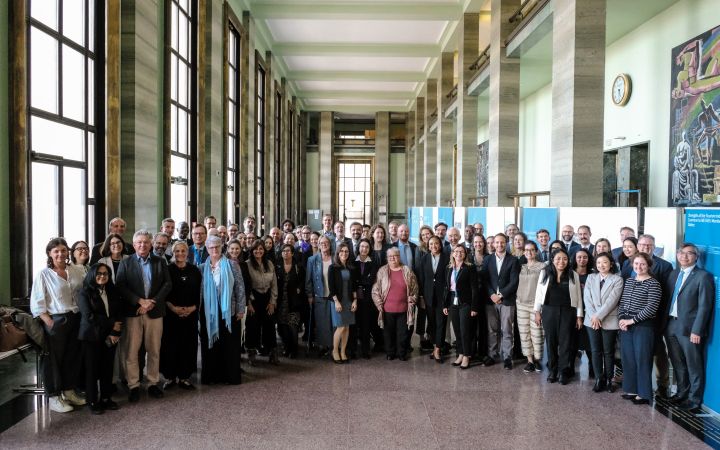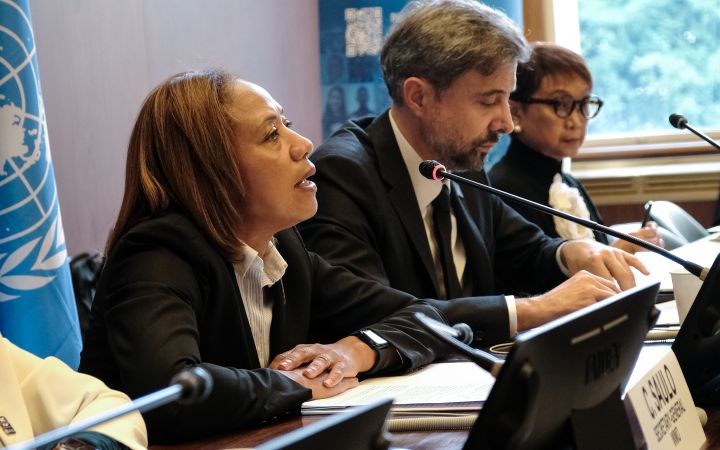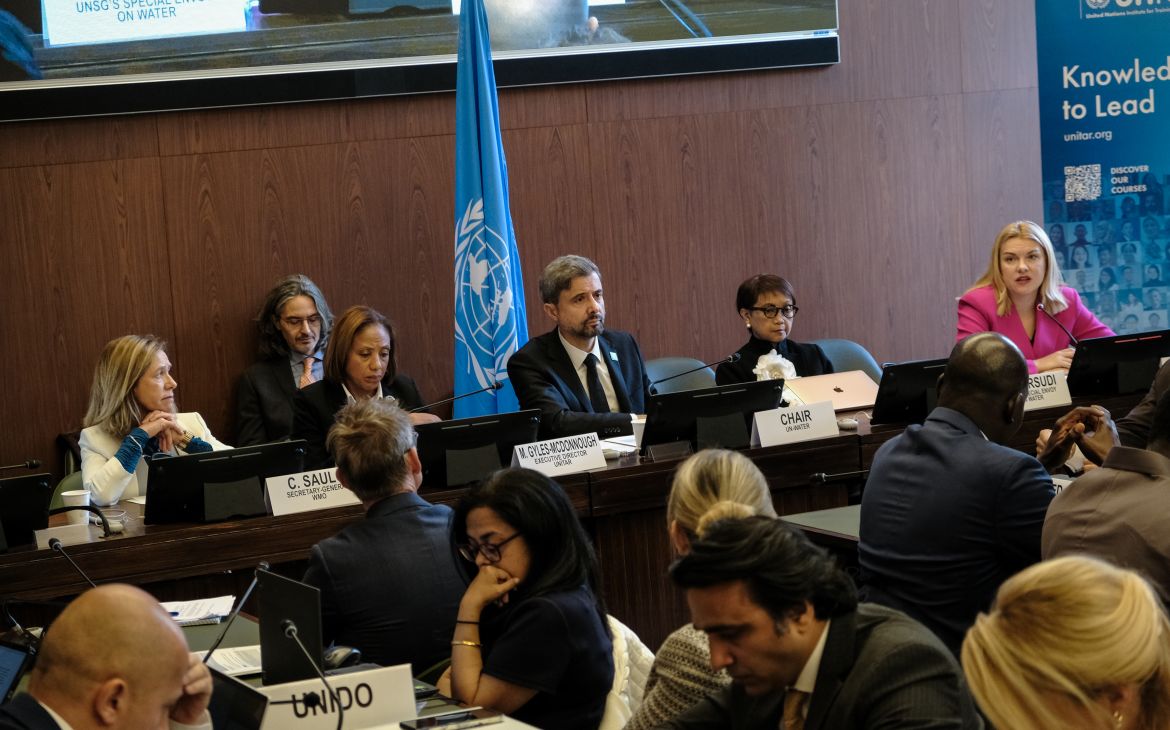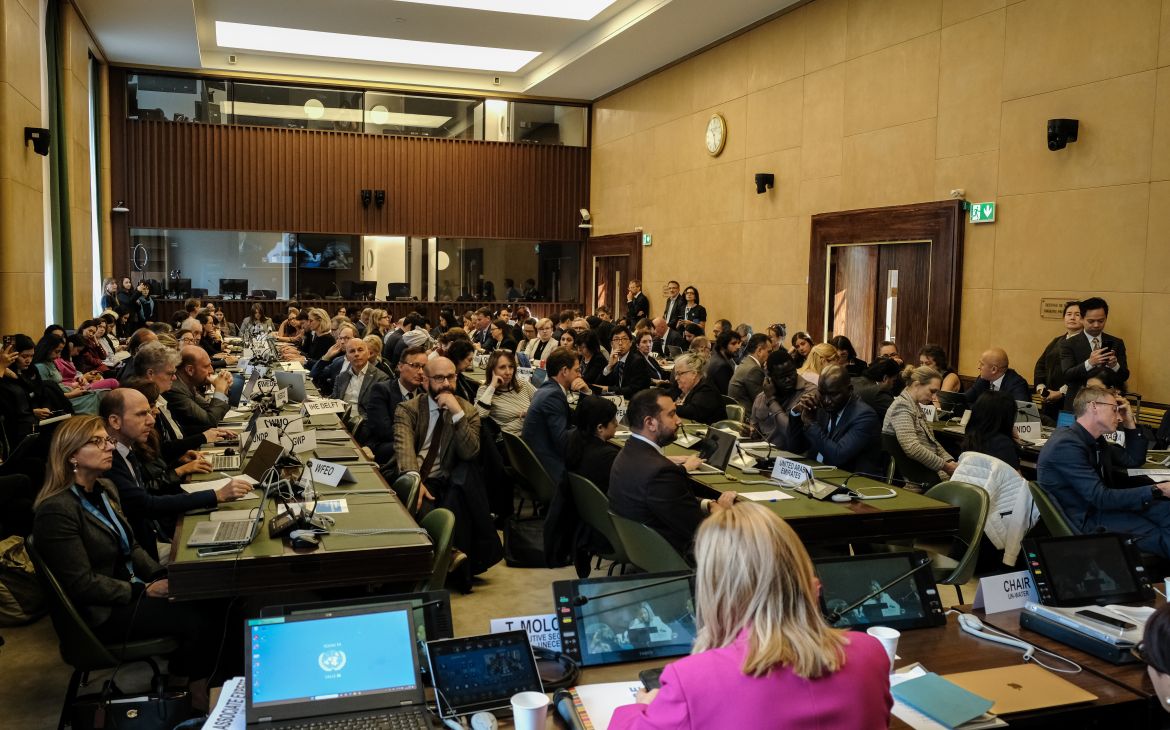Accelerating SDG 6 Implementation and Advancing Strategic Water Coordination
8 October 2025, Geneva, Switzerland - On 30 September and 1 October 2025, the United Nations Institute for Training and Research (UNITAR), through its Global Water Academy, successfully hosted the 42nd UN-Water Meeting at the Palais des Nations in Geneva. This high-level meeting brought together UN-Water's 36 Members and 51 Partners, alongside the representatives from Member States, for strategic coordination on the global water agenda, aiming to accelerate the achievement of Sustainable Development Goal 6 (SDG 6): Clean Water and Sanitation.
Strategy, Capacity Development, and Collective Action
The Meeting started with the opening remarks of the UN-Water Chair and IFAD President, Mr Alvaro Lario, UNITAR’s Executive Director, UN Assistant Secretary-General Ms Michelle Gyles-McDonnough, and the UN Secretary-General’s Special Envoy on Water, H.E. Ms Retno Marsudi.
In her opening remarks, Ms Gyles-McDonnough underscored the urgency of the water crisis, stating:
Time is not on our side.
She highlighted that capacity development is central to implementing all strategies and highlighted UNITAR's specific contributions through this lens, pointing to the UNITAR Global Water Academy's delivery of substantive training to over 7,500 professionals from 147 countries in key areas such as Integrated Water Resources Management, water-climate risk management, WASH systems, and water diplomacy. She warned that without capable institutions and skilled professionals, “no strategy, no financing, no infrastructure will deliver,” and called on the UN family to use the 2026 UN Water Conference, which will take place from December 2-4, 2026, to convert promises into measurable progress for people and the planet.
The UN-Water Chair, Mr Lario, further emphasized the critical need for a strategic narrative, asserting that the success of collective efforts depends on the ability to translate data into a global call to action.
The Special Envoy, H.E. Ms Marsudi, then called for data and science to serve as the foundation guiding effective water governance, stressing the importance of the 2026 UN Water Conference's long-term legacy and the need for strong political commitment.
During the substantive open session discussions, the meeting adopted the agenda and received updates on the implementation of past decisions and the preparations for global water awareness days, including World Toilet Day 2025 and World Water Day 2026. Attention then turned to the UN System-wide Strategy for Water and Sanitation, reviewing the progress of Priority Collaborative Actions (PCAs) to unify and amplify UN voices on water and sanitation and outlining the direction for the water agenda beyond 2030.
Furthermore, the meeting reviewed progress on the SDG 6 Capacity Development Initiative (CDI), a key accelerator of the Global Acceleration Framework, where Dr Ebru Canan-Sokullu, Director of the UNITAR Global Water Academy, detailed UNITAR's commitment to the future of the Capacity Development Initiative (CDI). She underscored that UNITAR will leverage its Global Water Academy and CIFAL Global Network to strengthen CDI implementation through expanded regional training, joint UN programming, and South-South cooperation, which will ensure knowledge-sharing and a unified, country-level approach aligned with the UNSDCF framework.
Member States Dialogue
On the second day of the 42nd UN-Water Meeting, a Member States Briefing and Dialogue Session was co-hosted by UN-Water Chair, UNITAR Executive Director, and UNSG Special Envoy on Water, where Executive Heads of World Meteorological Organization (WMO) and United Nations Economic Commission for Europe (UNECE) delivered their opening remarks.
During this session, UNITAR’s Executive Director, UN Assistant Secretary-General Ms Michelle Gyles-McDonnough, noted that the primary obstacle to progress on SDG 6 is “fragmented delivery systems,” highlighting four operational levers for acceleration: governance coherence, predictable finance, actionable data, and resilient infrastructure.
UNECE Executive Secretary, Ms Tatiana Molcean, emphasised the crucial role of regional cooperation mechanisms, particularly in transboundary water management. WMO’s Secretary-General, Prof Celeste Saulo, introduced WMO’s most recent report on the state of global water resources, noting that only one third of river basins worldwide were within what was considered normal conditions last year. This indicates that the majority of people on the planet experienced either excessive water through devastating floods or insufficient water due to drought and scarcity.
Key strategic discussions followed, providing updates on high-level intergovernmental events related to water, including the 2026 UN Water Conference. Co-hosts of the Conference, Senegal and the United Arab Emirates, represented by their ambassadors to the United Nations and other international organizations in Geneva, provided updates on preparations, covering stakeholder consultations, preparatory meetings, and the identification of main themes for the conference roadmap.
The outcomes of the 42nd UN-Water Meeting provide a clear strategic direction and collaborative blueprint for the UN system to confront the global water crisis, ensuring that water serves as the foundation for peace, resilience, and sustainable development. As the 42nd UN-Water Meeting host, UNITAR’s Global Water Academy remains committed to strengthening global water governance and accelerating the achievement of SDG 6 through capacity-building.
UN-Water is a coordination mechanism comprising United Nations entities (Members) and international organizations (Partners) working on water and sanitation issues. Its focus is on supporting countries to make progress in water and sanitation. UN-Water is guided by the UN System-wide Strategy for Water and Sanitation, launched in 2024, which seeks to accelerate action towards Sustainable Development Goal 6 – “to ensure availability and sustainable management of water and sanitation for all” – as part of the 2030 Agenda for Sustainable Development. UNITAR is a UN-Water Member.





